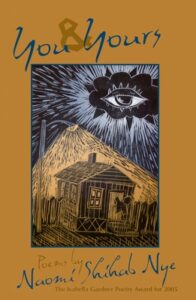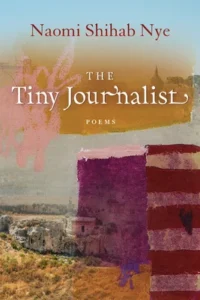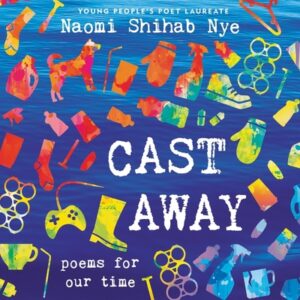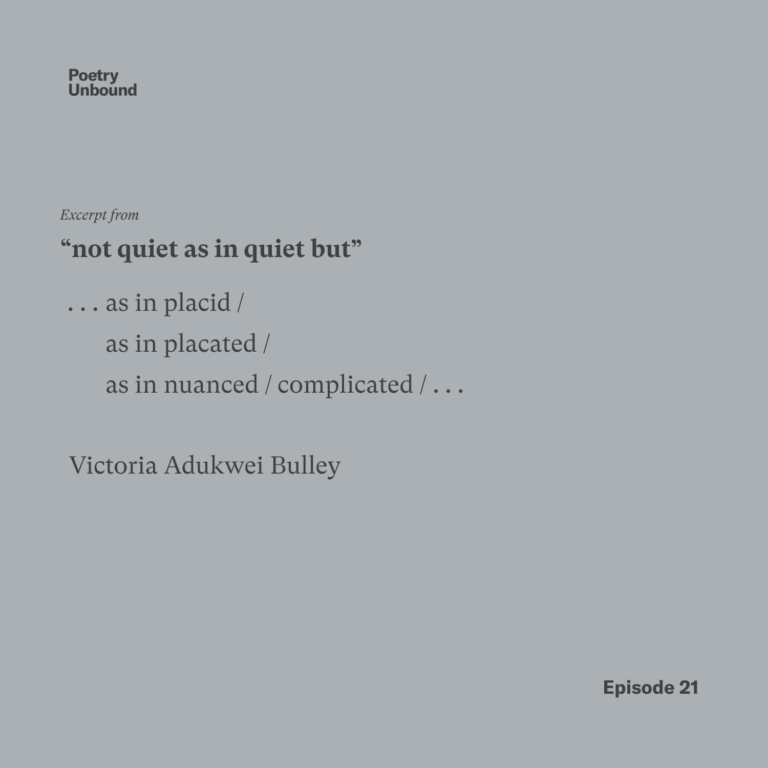Naomi Shihab Nye
I Feel Sorry for Jesus
What’s it like to be owned by the world, to have populations claiming you, to have millions speaking on your behalf? Naomi Shihab Nye takes a close look — from a distance — at Jesus, and herself.
We’re pleased to offer Naomi Shihab Nye’s poem, and invite you to connect with Poetry Unbound throughout this season.
Order your copy of Poetry Unbound: 50 Poems to Open Your World and join us in our vibrant conversational space on Substack.
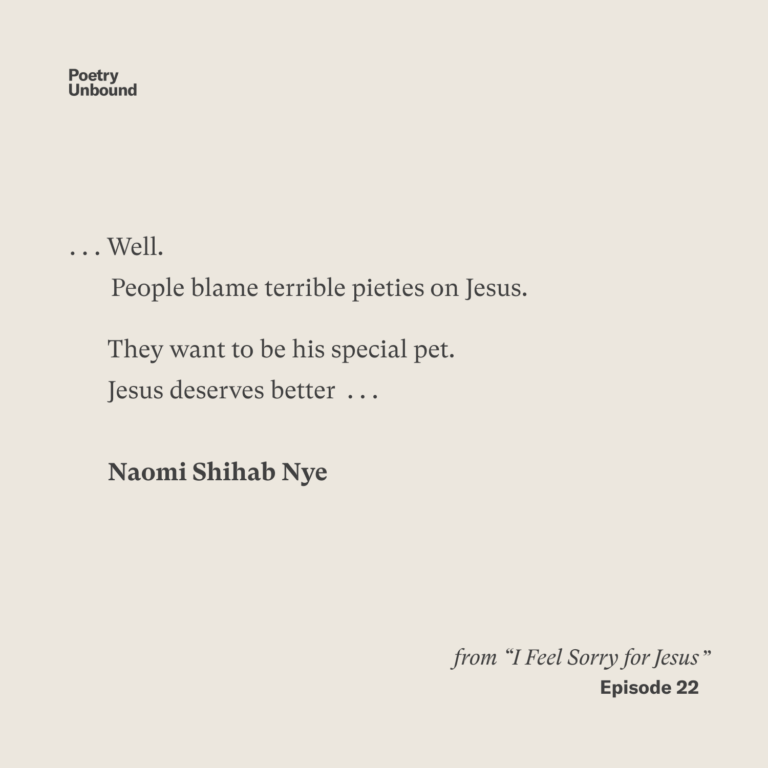
Guest

Naomi Shihab Nye is a professor of creative writing at Texas State University. From 2019-2021, Nye was the Young People's Poet Laureate through the Poetry Foundation. Her recent books include The Tiny Journalist (BOA Editions 2019), Voices in the Air: Poems for Listeners (Greenwillow Books 2022), Cast Away (HarperCollins 2020), and Everything Comes Next: Collected and New Poems (Greenwillow Books 2020). She received the 2019 Ivan Sandrof Lifetime Achievement Award from the National Book Critics Circle.
Transcript
Pádraig Ó Tuama: My name is Pádraig Ó Tuama, and one of the things I love about some poems is how they reveal themselves in vulnerability. You know, when you write a poem, you can often — or let me speak for myself — I can often go over a poem for six months before I show it to anyone. Polishing the lines, making sure it all works. And so much of that is about heart. But you’re also trying to come across as a craftsperson. But I love poems that show their own mistakes deliberately and use that in order to show something about what’s happening while you’re writing the poem.
[music: “Praise the Rain” by Gautam Srikishan]
“I Feel Sorry for Jesus” by Naomi Shihab Nye.
“I Feel Sorry for Jesus
“People won’t leave Him alone.
I know He said, wherever two or more
are gathered in my name…
but I’ll bet some days He regrets it.
“Cozily they tell you what He wants
and doesn’t want
as if they just got an e-mail.
Remember ‘Telephone’, that pass-it-on game
“where the message changed dramatically
by the time it rounded the circle?
Well.
People blame terrible pieties on Jesus.
“They want to be his special pet.
Jesus deserves better.
I think He’s been exhausted
for a very long time.
“He went into the desert, friends.
He didn’t go into the pomp.
He didn’t go into
the golden chandeliers
“and say, the truth tastes better here.
See? I’m talking like I know.
It’s dangerous talking for Jesus.
You get carried away almost immediately.
“I stood in the spot where He was born.
I closed my eyes where He died and didn’t die.
Every twist of the Via Dolorosa
was written on my skin.
“And that makes me feel like being silent
for Him, you know? A secret pouch
of listening. You won’t hear me
mention this again.”
[music: “Toothless Slope” by Blue Dot Sessions]
I love this poem. I remember the first time I read it, I barked with laughter, because it was so funny and so clever. It’s such a poem that I was getting on board with immediately just thinking, “Yeah. You’re right. Yeah.” And then she turns the poem on itself.
“See? I’m talking like I know. / It’s dangerous talking for Jesus.” It’s easy in this poem to get on board to think, “yeah, they’re doing the wrong thing. They’re exaggerating this, or they’re getting that wrong.” And she’s building up a kind of a hyperbole and in great wit, I think, drawing in an audience of people who might go, “Yeah, I’m with you.” And suddenly I’m the audience. And suddenly the spotlight’s on me, even as she’s shining it on herself.
It’s such an extraordinary form of hospitality that Naomi Shihab Nye is doing here, not to make this a poem about us and them, but to make this a poem about us, and to say, “What’s going on, how are you using your language? Who do you use as an excuse for your own opinions to be shored up or amped up or given association with somebody that you might think, well, if they believe it, I want to believe it too?” I think it’s genius.
There’s a line early on enough in the poem, “They want to be his special pet.” And I think it’s such a, a brave line because to my mind, hidden underneath that is, “I want to be his special pet and I want Him to be my special pet.” Jesus of Nazareth as a religious character is so powerful and so easy to project onto and so useful for endorsing your particular point of view. And what Naomi Shihab Nye is doing is saying, “Maybe silence is faithfulness. Maybe a distance is a demonstration of something like devotion. Maybe keeping away is as important as trying to draw close.” And this, in the context of religion and association and power, that is such a fascinating and brilliant point to make in a poem.
[music: “Plate Glass” by Blue Dot Sessions]
In talking about this poem, the producer Gautam said that this poem seems to be less about Jesus and more about the idea of Jesus. And that I think is such a clever insight and such a, an important way to show how religion is often not about speaking about the hereafter, not about the world to come, but speaking about the world that’s right here. And religious characters, biblical characters, characters from any sacred tradition can be used as an excuse to speak about something other. In a way they’re just the ink that you use to write your own opinions.
Naomi Shihab Nye says, “Remember ‘Telephone’, that pass-it-on game // where the message changed dramatically / by the time it rounded the circle?” Here, in this line, she’s speaking about, “has a message changed dramatically from the historical figure of Jesus of Nazareth into the way that he’s spoken about now?”
That line follows up with, “Well. / People blame terrible pieties on Jesus.” Look at those words, “blame terrible pieties.” It’s an extraordinary critique of the way within which a character is spoken about in public language and the way within which she’s saying she does it.
The tone of this poem is so conversational, you know, “People won’t leave Him alone. / I know He said, wherever two or more / are gathered in my name…” that’s a quotation from the Gospel of Matthew, where Jesus of Nazareth has said, “Wherever two or more are gathered in my name, there I am in the midst of them.”
And right down to the end, where she says, “…that makes me feel like being silent / for Him, you know?” There’s a conversational, a lighthearted tone in this poem that is so much about not being lighthearted. It’s so much about saying, “Use your language carefully when you’re speaking about what matters.” It’s brilliant to hold something of great weight, the social implication for us/them splits that can happen in groups when it comes to using religious language. She does that by making it funny, by making it easy, by making it lighthearted and, especially, by confessing her own complicity in the very things she’s critiquing while she’s doing it.
[music: “The Spills” by Blue Dot Sessions]
There’s a few hinges in this poem. And one of the hinges that happens is where she’s been building up into something that almost sounds like it’s preaching. “He went into the desert, friends.” And “into the desert” is in italics. “He didn’t go into the pomp. / He didn’t go into / the golden chandeliers”. And she’s building up this brilliant auditory experience of hearing preaching, and then she turns it on itself. “See? I’m talking like I know.” And one of the things that you notice after this is that she begins to speak much more from herself after here. “It’s dangerous talking for Jesus.” And then it goes directly into first person narrative. “I stood in the spot where He was born. / I closed my eyes where He died and didn’t die. / Every twist of the Via Dolorosa / was written on my skin.”
The Via Dolorosa is the Way of Sorrows, which is the journey from Jerusalem out to the hill where Jesus of Nazareth was executed by the Romans. And in these three references: a reference to Bethlehem, where He was born, a reference to Jerusalem, where He died and didn’t die, and then a reference to that hill outside Jerusalem. She’s locating herself in each of them. And she’s seeing that sorrow’s written on her skin.
Naomi Shihab Nye is Palestinian American and by locating sorrow written on the skin of her who has associations to this place, she’s tying together, I think, the ways within which religious characters can be used to make such deep sectarian divisions by anybody and by all the peoples who have association with Jerusalem, with Bethlehem, with the Holy Land.
It’s an extraordinary thing that she’s doing by locating tension and the danger of association and the danger of preaching from the point of view of a solitary truth according to a religious narrative in this single poem. In a way, I think she’s putting forward a kind of a theological approach to the dangers of the theological language. It’s an anti-theology poem while being deep in its theology.
[music: “Memoriam” by Gautam Srikishan]
The opening line to the poem after the title is: “People won’t leave Him alone.” And that word “alone” is doing such a lot of work, you know. It indicates that Jesus wants to be let alone perhaps, or that Naomi Shihab Nye wants Him to be let alone. One of the things that she’s doing is looking at this character, not necessarily from a point of view of dogma or devotion, but also not against dogma or devotion. She’s looking at this character of Jesus and taking Him really seriously. Allowing Him to have a desire for solitude, to be unowned and, even deeper than that, un-commodified. And I find that in the opening line. I also find it right at the very end where she says, “And that makes me feel like being silent / for Him, you know? A secret pouch / of listening. You won’t hear me / mention this again.” She is taking Him so seriously, which is to say, what would it have been like to have been Him? And, perhaps, if she were to ever see Him, would she approach Him or would she demonstrate respect by distance? Would she give Him that gift of silence, and her commitment just to Him, but also to herself and to the reader of the poem. She speaks to all of us, the “you,” in “you know?” as well as “you won’t hear me mention this again.”
So much of this poem is about the character of Jesus, but it’s also about the ways which Naomi Shihab Nye is feeling awkward about the way we speak about others in public. Not when it comes to gossip, but when it comes to commodifying associations. And I think she’s while on the one hand speaking about Jesus of Nazareth, this poem is kind of an alert to the danger that can happen by seeking to commodify association. And she’s saying that distance can be a sign of deep regard.
[music: “Tessalit” by Blue Dot Sessions]
“I Feel Sorry for Jesus” by Naomi Shihab Nye.
“I Feel Sorry for Jesus
“People won’t leave Him alone.
I know He said, wherever two or more
are gathered in my name…
but I’ll bet some days He regrets it.
“Cozily they tell you what He wants
and doesn’t want
as if they just got an e-mail.
Remember ‘Telephone’, that pass-it-on game
“where the message changed dramatically
by the time it rounded the circle?
Well.
People blame terrible pieties on Jesus.
“They want to be his special pet.
Jesus deserves better.
I think He’s been exhausted
for a very long time.
“He went into the desert, friends.
He didn’t go into the pomp.
He didn’t go into
the golden chandeliers
“and say, the truth tastes better here.
See? I’m talking like I know.
It’s dangerous talking for Jesus.
You get carried away almost immediately.
“I stood in the spot where He was born.
I closed my eyes where He died and didn’t die.
Every twist of the Via Dolorosa
was written on my skin.
“And that makes me feel like being silent
for Him, you know? A secret pouch
of listening. You won’t hear me
mention this again.”
[music: “Praise the Rain” by Gautam Srikishan]
Chris Heagle: “I Feel Sorry for Jesus” comes from Naomi Shihab Nye’s book You and Yours. Thank you to BOA Editions who gave us permission to use Naomi’s poem. Read it on our website at onbeing.org.
[music: “Praise the Rain” by Gautam Srikishan]
Poetry Unbound is: Gautam Srikishan, Eddie Gonzalez, Lilian Vo, Lucas Johnson, Amy Chatelaine, Kayla Edwards, and me, Chris Heagle.
Our music is composed and provided by Gautam Srikishan and Blue Dot Sessions.
This podcast is produced by On Being Studios, which is located on Dakota land. Open your world to poetry with us by subscribing to our Substack newsletter at poetryunbound.org. You may also enjoy our other podcast On Being with Krista Tippett, or our newsletter, The Pause. Visit us at onbeing.org to find out more.
Pádraig Ó Tuama: Friends, thanks very much for listening to Poetry Unbound, whether you’re new or you’ve listened to them all — your attention makes everything worthwhile. I’ve got some news: I’ve written a book, Poetry Unbound: 50 Poems to Open Your World. There’s 50 poems, each with a fresh essay written by me. I’d love it if you’d buy it, or buy a few. And you can join up to our free interactive newsletter, as well. Links to everything at poetryunbound.org.
Books & Music
Recommended Reading
The On Being Project is an affiliate partner of Bookshop.org and Amazon.com. Any earnings we receive through these affiliate partnerships go into directly supporting The On Being Project.





